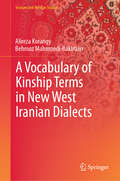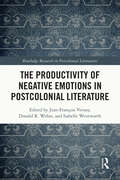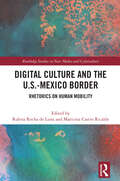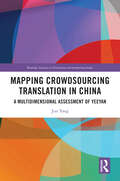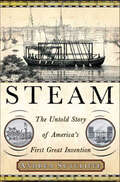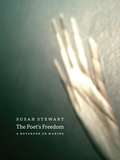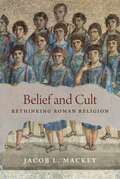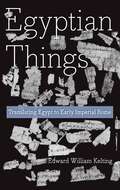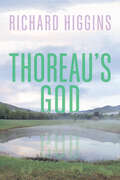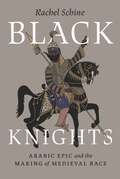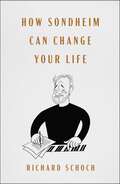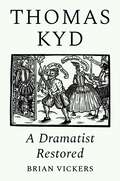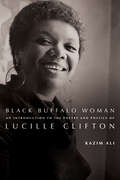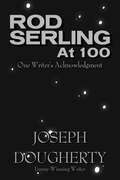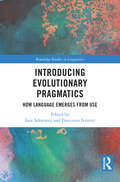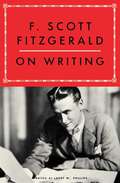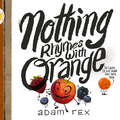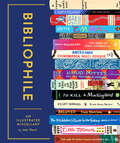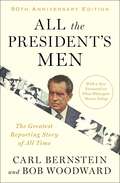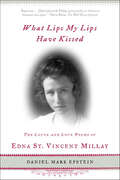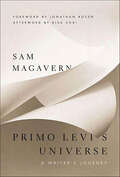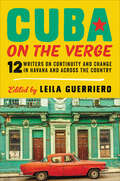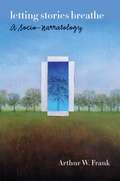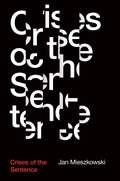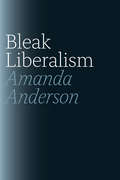- Table View
- List View
A Vocabulary of Kinship Terms in New West Iranian Dialects (Iranian and Persian Studies)
by Alireza Korangy Behrooz Mahmoodi-BakhtiariThis book is the first of its kind in providing a lexicon of kinship terms prevalent in the Western dialects of Iran, with a parallel glossary in English. It engages the dialects and their terminology in the English language to bring to purview how language imitates life, particularly in rural settings. Subsequently, it gives a glimpse into the irrefutable relation that exists between culture and word usage. In doing so, it serves as a cultural manifesto as it pertains to Persian language, poetics, and applied linguistics and is relevant to linguists, cultural scholars, Anthropologists and students in Persian language, literature, and culture and certainly all Iranian languages.
The Productivity of Negative Emotions in Postcolonial Literature (Routledge Research in Postcolonial Literatures)
by Donald R. Wehrs Isabelle WentworthThis volume explores the possibilities and potentialities of “negative” affect in postcolonial literature and literary theory, featuring work on postcolonial studies, First Nations studies, cognitive cultural studies, cognitive historicism, reader response theory, postcolonial feminist studies, and trauma studies. The chapters of this work investigate negative affect in all its types and dimensions: analyses of the structures of feeling created by socio-political forces; assemblages and alliances produced by negative emotion; enactive interrelationships of emotion and environment; and the ethical implications of emotional response, to name a few. It seeks to rebrand “negative” emotions as productive forces which can paradoxically confer pleasure, agential power, and social progress through literary representation.
Digital Culture and the U.S.-Mexico Border: Rhetorics on Human Mobility (Routledge Studies in New Media and Cyberculture)
by Rubria Rocha de Luna Maricruz Castro RicaldeConceptualizing how digital artifacts can function as a frontier mediated by technology in the geographical, physical, sensory, visual, discursive, and imaginary, this volume offers an interdisciplinary analysis of digital material circulating online in a way that creates a digital dimension of the Mexico-U.S. border.In the context of a world where digital media has helped to shape geopolitical borders and impacted human mobility in positive and negative ways, the book explores new modes of expression in which identification, memory, representation, persuasion, and meaning-making are created, experienced, and/or circulated through digital technologies. An interdisciplinary team of scholars looks at how quick communications bring closer transnational families and how online resources can be helpful for migrants, but also at how digital media can serve to control and reinforce borders via digital technology used to create a system of political control that reinforces stereotypes. The book deconstructs digital artifacts such as the digital press, social media, digital archives, web platforms, technological and artistic creations, visual arts, video games, and artificial intelligence to help us understand the anti-immigrant and dehumanizing discourse of control, as well as the ways migrants create vernacular narratives as digital activism to break the stereotypes that afflict them.This timely and insightful volume will interest scholars and students of digital media, communication studies, journalism, migration, and politics.
Mapping Crowdsourcing Translation in China: A Multidimensional Assessment of Yeeyan (Routledge Advances in Translation and Interpreting Studies)
by Jun YangYang explores the use of crowdsourcing in translation within the Chinese context, focusing on Yeeyan – the largest online translation community in China. As one of the world’s largest markets for language content consumption, China experiences significant demand for translation services. Yeeyan, a pioneer among amateur translation communities in China, offers an autonomous environment where the public collectively determines the content they wish to import from foreign languages.The book conducts a holistic evaluation of crowdsourcing translation using a multidimensional analytical framework, emphasising the interrelations among agents, processes, products, and crowdsourcing environments. Using the Yeeyan community as a case study, the book investigates the motivations behind participation in Yeeyan, the quality of translations produced, the extent to which this quality can be controlled, and how learning occurs through their participation. The analysis includes the two primary types of projects facilitated by Yeeyan – article translation for knowledge-sharing and book translation for commercial publication. Additionally, Yang explores the emerging field of crisis translation - assessing the applications of crowdsourcing in disaster contexts and exploring the ethical implications involved. Drawing on empirically informed results, the book proposes recommendations for the effective design and organisation of crowdsourcing translation projects and elucidates how such initiatives can be optimally utilised in both translation production and translation training endeavours.This book is a valuable contribution to the field of translation studies, offering a detailed examination of crowdsourcing translations and the participatory culture of the Chinese internet.
Steam: The Untold Story of America's First Great Invention
by Andrea SutcliffeIn 1807, Robert Fulton, using an English mail-order steam engine, chugged four miles an hour up the Hudson River, passing into popular folklore as the inventor of the steamboat. However, the true first passenger steamboat in America, and the world, was built from scratch, and plied the Delaware River in 1790, almost two decades earlier. Its inventor, John Fitch, never attained Fulton's riches, and was rewarded with ridicule and poverty. Considering there was not a single working steam engine in America in the early 1780s, Fitch's steamboat's development was nothing short of remarkable. But he faced competition from the start, and he and several other inventors fought a string of bitter battles, legal and otherwise. Steam tells the dramatic story of Fitch and his adversaries, weaving their lives into a fascinating tale including the likes of George Washington, Thomas Jefferson, and Benjamin Franklin. It is the story behind America's first important venture in technology, the persevering and colorful men that made it happen, and the great invention that moved a new nation westward.
The Poet's Freedom: A Notebook on Making
by Susan StewartWhy do we need new art? How free is the artist in making? And why is the artist, and particularly the poet, a figure of freedom in Western culture? The MacArthur Award–winning poet and critic Susan Stewart ponders these questions in The Poet’s Freedom. Through a series of evocative essays, she not only argues that freedom is necessary to making and is itself something made, but also shows how artists give rules to their practices and model a self-determination that might serve in other spheres of work.Stewart traces the ideas of freedom and making through insightful readings of an array of Western philosophers and poets—Plato, Homer, Marx, Heidegger, Arendt, Dante, and Coleridge are among her key sources. She begins by considering the theme of making in the Hebrew Scriptures, examining their accountof a god who creates the world and leaves humans free to rearrange and reform the materials of nature. She goes on to follow the force of moods, sounds, rhythms, images, metrical rules, rhetorical traditions, the traps of the passions, and the nature of language in the cycle of making and remaking. Throughout the book she weaves the insight that the freedom to reverse any act of artistic making is as essential as the freedom to create. A book about the pleasures of making and thinking as means of life, The Poet’s Freedom explores and celebrates the freedom of artists who, working under finite conditions, make considered choices and shape surprising consequences. This engaging and beautifully written notebook on making will attract anyone interested in the creation of art and literature.
Belief and Cult: Rethinking Roman Religion
by Jacob L. MackeyA groundbreaking reinterpretation that draws on cognitive theory to show that belief wasn’t absent from—but rather was at the heart of—Roman religionBelief and Cult argues that belief isn’t uniquely Christian but was central to ancient Roman religion. Drawing on cognitive theory, Jacob Mackey shows that despite having nothing to do with salvation or faith, belief underlay every aspect of Roman religious practices—emotions, individual and collective cult action, ritual norms, social reality, and social power. In doing so, he also offers a thorough argument for the importance of belief to other non-Christian religions.At the individual level, the book argues, belief played an indispensable role in the genesis of cult action and religious emotion. However, belief also had a collective dimension. The cognitive theory of Shared Intentionality shows how beliefs may be shared among individuals, accounting for the existence of written, unwritten, or even unspoken ritual norms. Shared beliefs permitted the choreography of collective cult action and gave cult acts their social meanings. The book also elucidates the role of shared belief in creating and maintaining Roman social reality. Shared belief allowed the Romans to endow agents, actions, and artifacts with socio-religious status and power. In a deep sense, no man could count as an augur and no act of animal slaughter as a successful offering to the gods, unless Romans collectively shared appropriate beliefs about these things.Closely examining augury, prayer, the religious enculturation of children, and the Romans’ own theories of cognition and cult, Belief and Cult promises to revolutionize the understanding of Roman religion by demonstrating that none of its features makes sense without Roman belief.
Egyptian Things: Translating Egypt to Early Imperial Rome
by Edward William KeltingA free ebook version of this title is available through Luminos, University of California Press’s Open Access publishing program. Visit www.luminosoa.org to learn more. After the deaths of Antony and Cleopatra, Rome finally took control of Egypt. This occupation simultaneously facilitated and circumscribed the exchange of goods, people, and ideas along the paths carved across Rome’s burgeoning empire. In this book, Edward Kelting sets out to recapture one of these systems of exchange: the vibrant literary tradition known as Aegyptiaca—or "Egyptian things"—in which culturally mixed authors wrote about Egypt for a Greek and Roman audience. These authors have been dismissed as not really "Egyptian," and their contemporary popularity has been ignored. But as Kelting powerfully argues, this genre in fact constitutes a vibrant intellectual tradition, developed from heterogeneous influences but deeply engaged with Egypt’s pharaonic past. In contrast to usual narratives of Roman domination, Kelting uncovers a complex project of political engagement and cultural translation in which Egyptians, Greeks, and Romans all participated.
Thoreau's God
by Richard HigginsMeditative reflections on the great spiritual seeker’s deeply felt experience of the divine. Henry David Thoreau’s spiritual life is a riddle. Thoreau’s passionate critique of formal religion is matched only by his rapturous descriptions of encounters with the divine in nature. He fled the church only to pursue a deeper communion with a presence he felt at the heart of the universe. He called this illimitable presence many names, but he often called it God. In Thoreau’s God, Richard Higgins invites seekers—religious or otherwise—to walk with the great Transcendentalist through a series of meditations on his spiritual life. Thoreau offers us no creed, but his writings encourage reflection on how to live, what to notice, and what to love. Though his quest was deeply personal, Thoreau devoted his life to communicating his experience of an infinite, wild, life-giving God. By recovering this vital thread in Thoreau’s life and work, Thoreau’s God opens the door to a new understanding of an original voice in American religion that speaks to spiritual seekers today.
Black Knights: Arabic Epic and the Making of Medieval Race
by Rachel SchineA new account of racial logics in premodern Islamic literature. In Black Knights, Rachel Schine reveals how the Arabic-speaking world developed a different form of racial knowledge than their European neighbors during the Middle Ages. Unlike in European vernaculars, Arabic-language ideas about ethnic difference emerged from conversations extending beyond the Mediterranean, from the Sahara to the Indian Ocean. In these discourses, Schine argues, racialized blackness became central to ideas about a global, ethnically inclusive Muslim world. Schine traces the emergence of these new racial logics through popular Islamic epics, drawing on legal, medical, and religious literatures from the period to excavate a diverse and ever-changing conception of blackness and race. The result is a theoretically nuanced case for the existence and malleability of racial logics in premodern Islamic contexts across a variety of social and literary formations.
How Sondheim Can Change Your Life
by Richard SchochDiscover the powerful and universal lessons from the music and lyrics of Stephen Sondheim, the genius behind such musical theater masterworks as Company, West Side Story, and Into the Woods.Stephen Sondheim died on November 26, 2021, but for countless fans around the world, he is &“still here,&” to quote one of his lyrics. With acclaimed revivals of his landmark shows occurring around the world and introducing new generations to the man who transformed American musical theater, Sondheim&’s legacy has only grown. What is it about such classic songs as &“Rose&’s Turn&” from Gypsy, &“Send in the Clowns&” from A Little Night Music, and &“Children Will Listen&” from Into the Woods that speaks to us so intimately and profoundly? How Sondheim Can Change Your Life makes the case that Sondheim&’s greatness—beyond the clever lyrics and adventurous music—rests in his ability to tell stories that relate to us all. From Louise&’s desire for freedom as Gypsy Rose Lee to Sweeney Todd&’s thirst for revenge, we as an audience relate easily to Sondheim&’s characters. His works understand us as much as we understand them. Following the arc of Sondheim&’s career, How Sondheim Can Change Your Life is rich with stories about productions and iconic performers, deep readings of his music and lyrics, and insights into his creative process. But more than that, it reveals how Sondheim&’s works can enrich our own lives.
Thomas Kyd: A Dramatist Restored
by Brian VickersA groundbreaking new account of the author of The Spanish Tragedy that establishes him as a major Elizabethan dramatistThomas Kyd (1558–1594) was a highly regarded dramatist and the author of The Spanish Tragedy, the first revenge tragedy and the most influential Elizabethan play. In this first full study of his life and works, Brian Vickers discusses Kyd&’s accepted canon as well as three additional plays Vickers has newly identified as having been written by Kyd—exciting discoveries that establish him as a major dramatist.Thomas Dekker, a fellow Elizabethan dramatist, referred to &“industrious Kyd,&” which suggests a greater output than the three plays traditionally attributed to him—The Spanish Tragedy, Soliman and Perseda, and Cornelia. Kyd worked between 1585 and 1594, when the plague led to the anonymous publication of many plays because of the breakup of several London theatre companies. Researching this corpus, Vickers has identified Kyd&’s authorship of three more plays: Arden of Faversham, the first domestic tragedy, King Leir and his three daughters, a tragicomedy that provided Shakespeare with his main source, and Fair Em, a love comedy. These attributions are based on two forms of evidence: unique similarities of plot between Kyd&’s acknowledged and newly attributed plays and many unique phrases shared by all six plays as identified by modern software.Discussing all the plays in detail and placing them in biographical and historical context, Thomas Kyd offers a major reassessment of an underappreciated Elizabethan playwright.
Black Buffalo Woman: An Introduction to the Poetry & Poetics of Lucille Clifton
by Kazim AliThis long-awaited and much-needed volume shines new light on one of America’s most beloved, and profound, poets—Lucille Clifton.Black Buffalo Woman is a deep, comprehensive dive into Clifton’s work through the eyes of celebrated poet and scholar, Kazim Ali. Collecting chapters of Clifton’s early manuscripts, late drafts, and integrating her books of children’s literature, Ali’s meticulously researched volume provides a brilliant and fresh perspective on Clifton’s life and work.Various chapters examine Clifton’s treatment of the body as a site of both joy and danger, spirituality, and interrogation of American history, politics, and popular culture. The result of Ali’s scholarship and care highlights a dazzling array of Clifton’s poetic techniques and forms that will continue to inspire poets for decades to come.
Rod Serling at 100: One Writer's Acknowledgment
by Joseph DoughertyEmmy-winning writer and lifelong Rod Serling fan Joseph Dougherty (thirtysomething, Pretty Little Liars) takes a deep dive into the writing of the Twilight Zone creator on the occasion of his 100th birthday.The year 2024 marks the centenary of Rod Serling, creator of The Twilight Zone and Night Gallery. Emmy-winning writer Joseph Dougherty (thirtysomething, Pretty Little Liars) picked this special anniversary to reflect on Serling and his contributions to television drama. An appreciation and exploration of the six-time Emmy-winning writer&’s catalogue, Rod Serling at 100: One Writer&’s Acknowledgment looks at some of Serling&’s best known work and also some of his least acknowledged, inviting a new perspective on a master storyteller. In the process, Dougherty takes a personal look at the time he spent in The Twilight Zone that led to his own award-winning writing career
Introducing Evolutionary Pragmatics: How Language Emerges from Use (Routledge Studies in Linguistics)
by Ines Adornetti and Francesco FerrettiThis collection highlights a range of perspectives on the emerging body of research on evolutionary pragmatics, expanding the borders of language evolution research and indicating exciting new directions for the future of the field.The volume adopts a broad view of pragmatics, providing a counterpoint to classical models of language evolution by exploring the ways in which the origins of language can be traced through the emergence of language structures from use in context. The book synthesizes different lines of inquiry, ranging from evolutionary linguistics to cognitive linguistics, philosophy, and cognitive pragmatics, among other fields, which foreground the impact of the environment on language and of language, through speaker use, on context. The volume is organized around three sections, each taking in turn a different dimension of evolutionary pragmatics research; the origins of language as seen in animal communication; a closer look at the use of language in interaction for the formation of communication channel and linguistic meaning; the role of cooperation and competition dynamics for the emergence of language structure.This book will be of particular interest to scholars in evolutionary linguistics, language origins, cognitive pragmatics, cognitive archaeology, and cognitive semiotics, as well as related areas in philosophy, psychology, and anthropology.
F. Scott Fitzgerald On Writing
by F. Scott Fitzgerald Larry W. PhillipsA collection of F. Scott Fitzgerald&’s remarks on his craft, taken from his works and letters to friends and colleagues—an essential trove of advice for aspiring writers. As F. Scott Fitzgerald famously decreed, &“An author ought to write for the youth of his own generation, the critics of the next, and the schoolmasters of ever after.&” Fitzgerald's own work has gone on to be reviewed and discussed for over one hundred years. His masterpiece The Great Gatsby brims with the passion and opulence that characterized the Jazz Age—a term Fitzgerald himself coined. These themes also characterized his life: Fitzgerald enlisted in the US army during World War I, leading him to meet his future wife, Zelda, while stationed in Alabama. Later, along with Ernest Hemingway and other American artist expats, he became part of the &“Lost Generation&” in Europe. Fitzgerald wrote books &“to satisfy [his] own craving for a certain type of novel,&” leading to modern American classics including Tender Is the Night, This Side of Paradise, The Beautiful and Damned. In this collection of excerpts from his books, articles, and personal letters to friends and peers, Fitzgerald illustrates the life of the writer in a timeless way.
Nothing Rhymes with Orange
by Adam RexWe all know nothing rhymes with orange. But how does that make Orange feel? Well, left out! When a parade of fruit gets together to sing a song about how wonderful they are—and the song happens to rhyme—Orange can't help but feel like it's impossible for him to ever fit in. But when one particularly intuitive Apple notices how Orange is feeling, the entire English language begins to become a bit more inclusive. Beloved author-illustrator Adam Rex has created a hilarious yet poignant parable about feeling left out, celebrating difference, and the irrefutable fact that nothing rhymes with orange. Plus, this is the fixed format version, which looks almost identical to the print edition.
Bibliophile: An Illustrated Miscellany (Bibliophile Ser.)
by Jane MountPerfect gift for book lovers, writers and your book clubBook lovers rejoice! In this love letter to all things bookish, Jane Mount brings literary people, places, and things to life through her signature and vibrant illustrations.Readers of Jane Mount's Bibliophile will delight in:Touring the world's most beautiful bookstoresTesting their knowledge of the written word with quizzesFinding their next great read in lovingly curated stacks of booksSampling the most famous fictional mealsPeeking inside the workspaces of their favorite authorsA source of endless inspiration, literary facts and recommendations: Bibliophile is pure bookish joy and sure to enchant book clubbers, English majors, poetry devotees, aspiring writers, and any and all who identify as book lovers.If you have read or own: I’d Rather Be Reading: The Delights and Dilemmas of the Reading Life; The Written World: The Power of Stories to Shape People, History, and Civilization; or How to Read Literature Like a Professor: A Lively and Entertaining Guide to Reading Between the Lines; then you will want to read and own Jane Mount's Bibliophile.
All the President's Men (Bloomsbury Film Classics Ser.)
by Bob Woodward Carl Bernstein50th Anniversary Edition—With a new foreword on what Watergate means today. &“The work that brought down a presidency...perhaps the most influential piece of journalism in history&” (Time)—from the #1 New York Times bestselling authors of The Final Days. The most devastating political detective story of the century: two Washington Post reporters, whose brilliant, Pulitzer Prize-winning investigation smashed the Watergate scandal wide open, tell the behind-the-scenes drama the way it really happened. One of Time magazine&’s All-Time 100 Best Nonfiction Books, this is the book that changed America. Published just months before President Nixon&’s resignation, All the President&’s Men revealed the full scope of the scandal and introduced for the first time the mysterious &“Deep Throat.&” Beginning with the story of a simple burglary at Democratic headquarters and then continuing through headline after headline, Bernstein and Woodward deliver a riveting firsthand account of their reporting. Their explosive reports won a Pulitzer Prize for The Washington Post, toppled the president, and have since inspired generations of reporters. All the President&’s Men is a riveting detective story, capturing the exhilarating rush of the biggest presidential scandal in US history as it unfolded in real time.
What Lips My Lips Have Kissed: The Loves and Love Poems of Edna St. Vincent Millay
by Daniel Mark EpsteinA noted biographer and poet illuminates the unique woman who wrote the greatest American love poetry of the twentieth centuryWhat Lips My Lips Have Kissed is the story of a rare sort of American genius, who grew up in grinding poverty in Camden, Maine. Nothing could save the sensitive child but her talent for words, music and drama, and an inexorable desire to be loved. When she was twenty, her poetry would make her famous; at thirty she would be loved by readers the world over.Edna St. Vincent Millay was widely considered to be the most seductive woman of her age. Few men could resist her, and many women also fell under her spell. From the publication of her first poems until the scandal over Fatal Interview twenty years later, gossip about the poet's liberated lifestyle prompted speculation about who might be the real subject of her verses.Using letters, diaries and journals of the poet and her lovers that have only recently become available, Daniel Mark Epstein tells the astonishing story of the life, dedicated to art and love, that inspired the sublime lyrics of Edna St. Vincent Millay.
Primo Levi's Universe: A Writer's Journey
by Sam MagavernPrimo Levi is best known as a memoirist of Auschwitz, but he was also a scientist, fiction writer, and poet: in short, a Renaissance man. Primo Levi's Universe offers a multi-faceted portrait of the heroic man who turned the concentration camp experience into beautiful yet terrifying literature. Over time, Levi developed an original world-view which he conveyed in his writing. Through careful readings of Levi's works, Sam Magavern finally does justice to his calm rationality, dark poetry, essential beliefs and wit. Levi's art and life are inextricably intertwined, and this book presents them together, allowing each to shed light on the other.
Cuba on the Verge: 12 Writers on Continuity and Change in Havana and Across the Country
by Leila GuerrieroSpanning politics and art, music and baseball, Cuba on the Verge is a timely look at a society’s profound transformation—from inside and outChange looms in Cuba. Just ninety miles from United States shores yet inaccessible to most Americans until recently, Cuba fascinates as much as it confounds. Images of the Buena Vista Social Club, wild nights at the Tropicana, classic cars, and bearded rebels clinching cigars only scrape the surface of Cuba’s complex history and legacy. As the US and Cuba move toward the normalization of diplomatic relations after an epic fifty-six-year standoff, we find ourselves face-to-face with one of the few places in the world that has been off limits to most Americans. We know that Cuba is changing, but from what and into what? And what does this change mean for the Cuban people as well as for the rest of the world? Standing on both sides of the divide, twelve of our most celebrated writers investigate this period of momentous transition in Cuba on the Verge. These essays span the spectrum, from Carlos Manuel Álvarez’s story of being among the last generation of Cubans to be raised under Fidel Castro to Patricia Engel’s look at how Cuba’s capital has changed through her years of riding across it with her taxi driver friend; from The New Yorker’s Jon Lee Anderson (who traveled with President Obama on the first trip to Cuba by an American president since the twenties) on being a foreigner in Cuba during the Special Period to Francisco Goldman on the Tropicana, then and now, to Leonardo Padura on the religion that is Cuban baseball. Cuba on the Verge is the definitive account of—and a unique glimpse at—a moment of upheaval and reinvention whose effects promise to reverberate across years and nations.
Letting Stories Breathe: A Socio-Narratology
by Arthur W. FrankStories accompany us through life from birth to death. But they do not merely entertain, inform, or distress us—they show us what counts as right or wrong and teach us who we are and who we can imagine being. Stories connect people, but they can also disconnect, creating boundaries between people and justifying violence. In Letting Stories Breathe, Arthur W. Frank grapples with this fundamental aspect of our lives, offering both a theory of how stories shape us and a useful method for analyzing them. Along the way he also tells stories: from folktales to research interviews to remembrances. Frank’s unique approach uses literary concepts to ask social scientific questions: how do stories make life good and when do they endanger it? Going beyond theory, he presents a thorough introduction to dialogical narrative analysis, analyzing modes of interpretation, providing specific questions to start analysis, and describing different forms analysis can take. Building on his renowned work exploring the relationship between narrative and illness, Letting Stories Breathe expands Frank’s horizons further, offering a compelling perspective on how stories affect human lives.
Crises of the Sentence
by Jan MieszkowskiThere are few forms in which so much authority has been invested with so little reflection as the sentence. Though a fundamental unit of discourse, it has rarely been an explicit object of inquiry, often taking a back seat to concepts such as the word, trope, line, or stanza. To understand what is at stake in thinking—or not thinking—about the sentence, Jan Mieszkowski looks at the difficulties confronting nineteenth- and twentieth-century authors when they try to explain what a sentence is and what it can do. From Romantic debates about the power of the stand-alone sentence, to the realist obsession with precision and revision, to modernist experiments with ungovernable forms, Mieszkowski explores the hidden allegiances behind our ever-changing stylistic ideals. By showing how an investment in superior writing has always been an ethical and a political as well as an aesthetic commitment, Crises of the Sentence offers a new perspective on our love-hate relationship with this fundamental compositional category.
Bleak Liberalism
by Amanda AndersonWhy is liberalism so often dismissed by thinkers from both the left and the right? To those calling for wholesale transformation or claiming a monopoly on “realistic” conceptions of humanity, liberalism’s assured progressivism can seem hard to swallow. Bleak Liberalism makes the case for a renewed understanding of the liberal tradition, showing that it is much more attuned to the complexity of political life than conventional accounts have acknowledged. Amanda Anderson examines canonical works of high realism, political novels from England and the United States, and modernist works to argue that liberalism has engaged sober and even stark views of historical development, political dynamics, and human and social psychology. From Charles Dickens’s Bleak House and Hard Times to E. M. Forster’s Howards End to Doris Lessing’s The Golden Notebook, this literature demonstrates that liberalism has inventive ways of balancing sociological critique and moral aspiration. A deft blend of intellectual history and literary analysis, Bleak Liberalism reveals a richer understanding of one of the most important political ideologies of the modern era.
